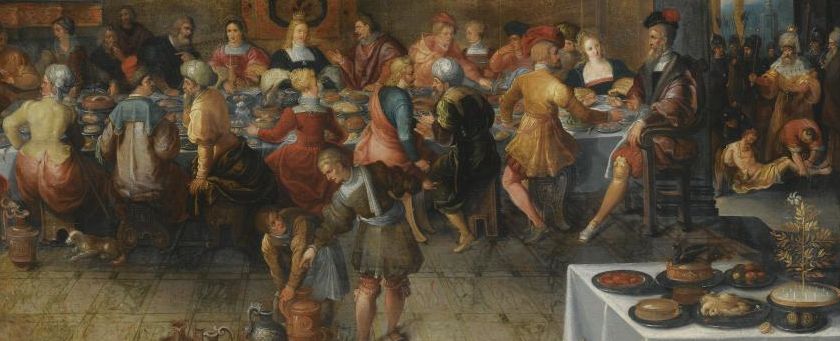How Will You Respond to the King's Invitation?
Twenty-Eighth Sunday of Ordinary Time, Year A

Readings:
Is. 25:6-10a; Ps. 23; Phil. 4:12-14, 19-20; Matt. 22:1-14
Today we are given two images of the Kingdom of Heaven. The first is from the prophet Isaiah, who describes God’s holy mountain, a reference to Jerusalem. It is a reminder of the prosperity of the Kingdom of Israel and how Jerusalem was at the heart of that prosperity, not simply from an economic standpoint, but because of the holy presence of God in the Jerusalem Temple. It is God who destroys the veil that veils all peoples; it is God who wipes away tears from every face; it is God who saves. The second image comes from Jesus, who, while standing in the Jerusalem Temple tells the chief priests and the elders of the people the parable of the Wedding Feast. The image of a banquet was commonly used to teach about heaven. We heard Isaiah speak of choice wines and juicy, rich food, and our Psalm echoes this with the table spread with food and the cup that is overflowing. All these images show us what great abundance awaits those who are invited to the heavenly banquet. The tricky part of this invitation, however, is how the different people respond.
As we reflect upon the parable of the Wedding Feast, we might ask: Who am I in this story? It might go without saying that the king and his son represent the Father and Jesus. But, what about the servants, the first set of guests, the second set of guests, the farmer, the businessman, the troops, the good ones on the road, the bad ones on the road, and the one without a wedding garment? Or from another perspective, are we one of the chief priests, one of the Pharisees, one of the elders, or are we one of Jesus’ disciples? With the parables, there are often two sets of characters: those in the story and those listening to the story. So, it’s helpful to consider both and how they connect.
At this point in Matthew’s Gospel, Jesus has already made his triumphant entry into Jerusalem to crowds singing, “Hosanna in the highest.” He has already cleared the Temple of the money changers saying, “My house shall be a house of prayer, but you are making it a den of thieves.” And naturally, the chief priests, who were in charge of the Temple, wanted to know by whose authority he has done this, but Jesus does not answer them. Instead, he gives them parables that describe their own actions, and they know it.
The parable of the Wedding Feast is one of many directed to the religious leadership in Jerusalem. Last week, it was the landowner’s vineyard and the tenants, this week, the wedding feast, both of which seem to summarize the history of the People of Israel. When it comes to the history of the People of Israel, they had their share of highs and lows. After they inherited the Promised Land, the Lord blessed them and they became a mighty nation. But, their lack of faith and love of riches led to their demise. Twice, they suffered exile; twice, they were destroyed by invaders from a foreign land. And every time exile was imminent, the Lord sent his messengers, the prophets, to warn them and call them back. It was their failure to listen that resulted in their demise.
In Jesus’ day, it appeared as though another exile was imminent. The Roman Empire had invaded their territory, had placed governors in Judea, and taken control of the tetrarchs. Might some of the religious leadership also be compromised? But, rather then write them off, Jesus invites them to consider this parable that seems to describe the history of Israel. How will they respond to the king’s invitation? Will they be like the first guests who refuse to attend? Will they be like the second guests who are more concerned with their businesses? Or will they be like the others who mistreated and killed the king’s servant? As readers of the Gospel, perhaps we can already see where this is going. Jesus has been predicting his Passion all along the road to Jerusalem, how he will be handed over to the chief priests and the elders, that they will kill him, and he will rise on the third day. But what about us?
If the first and second set of guests to be invited to the banquet had refused, where might we fit into the story? Might we be one of those on the streets or the main road? While the invitation was first offered to the chosen people, it is also offered to those outside the city, on the main road, which was was traveled by people of all nations. There are conditions, however, for being part of the heavenly feast: the idea of the wedding garment. And while the invitation was made to good and bad alike, the garment must be worn. Is the garment a symbol of faith? Is it a symbol of our baptismal robe? Is it a symbol of our cooperation with God’s grace throughout our life? Perhaps it is all these. Or, perhaps, no matter when or where we received that invitation, the garment is a symbol of our desire to be there.
And now, as we turn to the celebration of the Eucharist, the choicest of wines, and the Bread of Life, let us put on our wedding garments, for the feast of heaven is already before us.
Given during the COVID-19 pandemic.





Share this post
Twitter
Facebook
Pinterest
Email